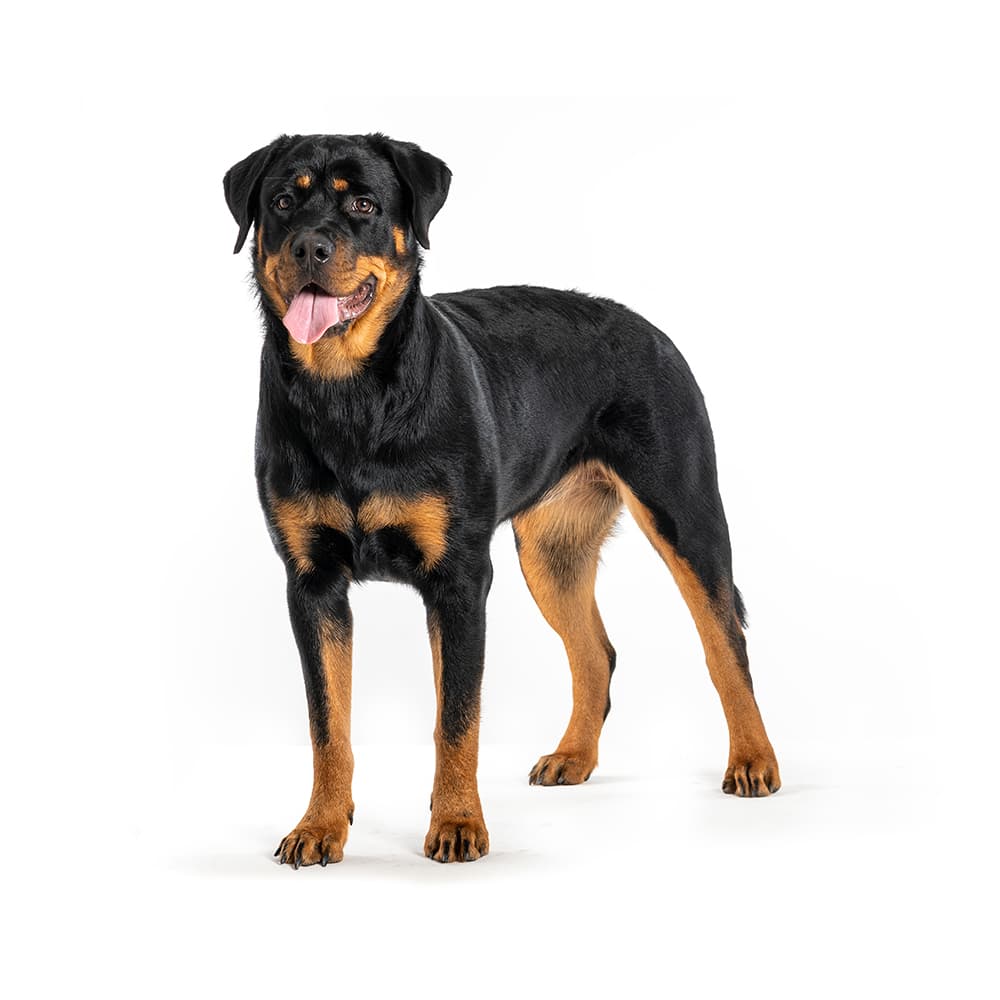Discover your dog's connection to this breed and 200+ others


Discover your dog's connection to this breed and 200+ others



The Rottweiler's origins can be traced back to the Roman Empire, where they were bred to herd livestock and pull carts laden with butchered meat to markets. They were also depended upon to protect their soldiers' food as they traveled around. Following the Romans' footsteps, Rottweilers migrated into what is now Germany. In the town of Rottweil, from which they received their name, these robust canines continued their work in herding livestock and pulling butcher's carts. They were known as Rottweil Metzgerhunds, or ""butchers' dogs."" After rail transport replaced cattle drives, the breed's popularity declined. However, Rottweilers saw a resurgence in the early 20th century due to their utility in police and military roles, as well as search and rescue missions.
Rottweilers can suffer from hip dysplasia, gastric torsion, elbow dysplasia, subaortic stenosis, progressive retinal atrophy, seizures, von Willebrand Disease, ectropion, entropion, cataracts, panosteitis, degenerative myelopathy, juvenile laryngeal paralysis and polyneuropathy, leukoencephalomyelopathy, myotubular myopathy 1, and neuroaxonal dystrophy. Cancer, particularly bone cancer, is more common in Rottweilers than in many other breeds.
Rottweilers are often described as confident, calm, and courageous, with a self-assured aloofness. They are protective of their families and can be reserved around strangers. Despite their protective nature, they are often very gentle and affectionate with their families. Rottweilers are intelligent and highly trainable, but require a firm, calm, consistent handler. Early socialization and positive reinforcement training are crucial for this breed.
A canine genetic lineage is a group of individuals or entire breeds that descended from common ancestors predating modern breed formation. Often these lineages are associated with a ‘type’ of dog with a unique historical working role and associated behaviors (e.g., herding, scent hunting, etc.).
Herding dogs are known for their high intelligence, trainability, and strong work ethic. These breeds originated in areas where managing livestock was an important part of daily life and had large pastoral lands. These breeds were specifically developed to help farmers and shepherds move, manage, and protect herds of livestock. Breeds within the herding dog lineage are agile and are known to have a natural herding instinct, where they like to keep their animals together. They are loyal and attentive to their handlers and are eager to please and are also highly aware of their environment. Many breeds within this linage have gone on to work as rescue and police dogs.
Example breeds with ancestry from this lineage include Border Collie, Cardigan Welsh Corgi, and German Shepherd.
The Rottweiler is the 8th most popular breed in the U.S. according to the AKC's 2021 rankings.
A Rottweiler named Duke is a character in the movie "The Secret Life of Pets" and its sequel.
Rottweilers have been used as search and rescue dogs, guide dogs for the blind, and police dog.
https://www.akc.org/dog-breeds/rottweiler/
https://www.ukcdogs.com/Rottweiler
https://www.fci.be/en/nomenclature/ROTTWEILER-147.html
https://www.petmd.com/dog/breeds/c_dg_rottweiler
https://www.pawprintgenetics.com/products/breeds/193/
https://rottweilerhealth.org/
Recommended by top vets with decades of experience
21 breeds
64 genetic health markers
50 genetic trait markers
